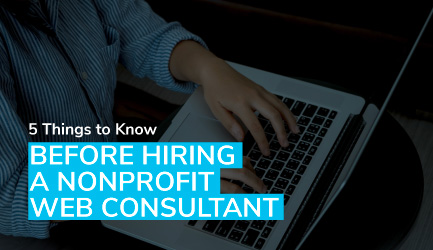
A well-designed website can do wonders for your nonprofit, from helping you raise awareness for your cause, to leveling up your fundraising, to sharing the impact you’re making on your community.
However, it can be challenging to create a winning nonprofit website to achieve these purposes, especially when your expertise is in fundraising rather than website development and design.
That’s where a nonprofit web consultant comes in. The right consultant can help you design and build your organization’s website from the ground up, taking the heavy lifting off of your plate so that your team can focus on what matters most—your mission.
In this quick guide, we’ll set you up for success in working with a nonprofit web consultant, covering five things you should know before selecting one:
- What a Web Consultant Does
- 3 Steps to Prepare to Work with a Web Consultant
- How to Find Potential Consultants
- The Hiring Process, Explained
- 4 Tips for Establishing a Working Relationship with a Consultant
Doing the right preparation beforehand will empower your nonprofit to strategically navigate the hiring process so that you partner with the right consultant who can help bring your vision for your website to life. Let’s dive in!
1. What a Web Consultant Does
In the nonprofit sector, there are many different types of consultants you can turn to for outside help. Aside from web consultants, there are a few other common types of consultants nonprofits work with:
- Fundraising consultants. These experts can help you design and execute campaigns, identify major donor prospects, and run successful fundraising events.
- HR consultants. The world of nonprofit HR is complex, and it can be tricky to navigate as your team grows over time. An HR consultant can help you improve your nonprofit as a workplace.
- Accounting and compliance consultants. Accounting and bookkeeping consultants are experts in nonprofit finance. These consultants can analyze your organization’s financial situation to provide insight on how to allocate and budget your funds. Compliance consultants can also help you navigate the tricky nonprofit charitable registration landscape.
While most consultants will provide advice and actionable recommendations for the problems your nonprofit asks them to solve, nonprofit web consultants tend to be more hands-on. Some will create your nonprofit’s website for you and help you maintain it over time. Web consultants may also offer other services, like building web applications, optimizing your website for performance on search engines, building online campaigns, or managing your Google Ad Grant account.
According to Cornershop Creative, the best part about working with a nonprofit-specific web consultant is that they’ll understand nonprofit work. With a perspective that takes into account your budget and the importance of your work, they’ll help you tell your nonprofit’s story online and be invested in getting results for your cause.
2. 3 Steps to Prepare to Work with a Web Consultant
To get the most out of your engagement with a nonprofit web consultant, you should do a little preparation beforehand. Your consultant will be most effective if you share specific problem areas to fix or goals that you’d like to achieve.
Here are three steps to take to prepare:
- Secure buy-in from your organization’s leadership. Since working with a web consultant will require an investment on your nonprofit’s part, everyone at your organization should be on board with the idea. Make sure to set expectations for the engagement and agree upon the budget you have to work with so that everyone is on the same page.
- Audit your website. If you already have a website, examine it to determine what is working well and what could be improved. For example, you might decide that you like the look of your events page, but your online donation form could use some work.
- Gather necessary background information. Collect information on your nonprofit that your consultant will need to redesign your website. For instance, you should be ready to present your branding guidelines or a brief history of your organization to help your consultant create a new website that is in line with your nonprofit’s mission and brand.
You should also identify what you want in a website consultant. For example, consider whether you want to hire a consultant in your local area that you can meet with in person or if you’re comfortable working with someone remotely. Identify who will be working with the consultant and how involved they will be in the website design process, and outline communication expectations in advance. This will help ensure you find a consultant that meets your specific needs.
3. How to Find Potential Consultants
After you’ve thoroughly prepared for working with a nonprofit web consultant, it’s time to explore your options. You can learn about different consultants via online research, including directories of nonprofit consultants, or by reaching out to other nonprofits to get recommendations.
Once you’ve assembled a list of potential consulting partners, research the following for each candidate:
- Price model. Understand how you’ll be paying your consultant before making any agreements with them. Some consultants have flat fees, while others charge based on the number of consultation sessions or hours worked.
- Past clients. Make sure your consultant has worked with nonprofits in the past, preferably ones that are roughly the same size as your organization and that operate in similar fields. You might also be able to browse a portfolio of previous client work.
- Work format. As mentioned before, how you work with your consultant should be top of mind, especially in an age of remote and hybrid work environments. Find out where each consultant is located and if they’re willing to work in-person, remotely, or do a bit of both, according to your needs.
- Consulting style. This may be more tricky to determine than the prior three points, but having a sense of how a consultant operates beforehand can be invaluable for finding a partner whose approach matches yours. For example, some consultants tend to be more hands-off and only respond to specific problems you identify, while others might have a more active communication style.
Finding the right partner will take some time, so be prepared to research each candidate thoroughly. You can also rely on the results of your website audit to make sure your chosen consultant can help you with your specific problems or projects.
4. The Hiring Process, Explained

Once you’ve narrowed down your list to a few top consultants, you can approach them to kick off the hiring process. Follow these steps to get off on the right foot with your potential partners:
- Develop a request for proposal (RFP). An RFP is a document that communicates your current needs and your expectations to your consultant. Your previous internal assessment should prepare you to create your RFP.
- Make initial contact. Call or send an introductory email to each potential consultant before submitting your RFP. This will help you develop an initial rapport with each consultant, ask questions about their services, and provide background information about your organization.
- Submit your RFP. Send your RFP to each consultant with a clear due date. Make sure to give each consultant an appropriate amount of time (a few weeks) to respond so they can return high-quality work.
After you receive a response from each consultant, begin reviewing their proposals. Consider assembling a small team or committee to help choose the one that most closely fits your nonprofit’s current needs. Look for consultants who provide actionable steps and set obtainable goals for your nonprofit in their plan.
5. 4 Tips for Establishing a Working Relationship with a Consultant
While sometimes you might need a web consultant for just one project, it’s often more beneficial to find a consultant you can develop a long-term partnership with. That way, the next time your nonprofit needs advice or technical support, you’ll already have a consultant to approach who is familiar with your organization.
Here are four tips for establishing a working relationship with a consultant that can stand the test of time:
- Clearly define your expectations. As you begin working with a web consultant, be clear about what your nonprofit needs and how you’ll measure your progress toward your goals, whether that means boosting website engagement metrics or meeting deadlines for a website relaunch. The consultant’s progress in these areas will help you gauge whether or not to work with them again.
- Provide needed resources and information. Whether it’s access to your nonprofit’s CMS or your brand guide, your consultant will need certain things from you in order to be successful in their work. Be prompt in providing any requested materials.
- Encourage collaboration and feedback. Communication will be key when working with a consultant. Don’t be afraid to give them feedback on their work or be more actively involved in the process when needed. This will help establish your relationship as a partnership instead of a transaction.
- Remember that at the end of the day, you know your organization best. While you should be open-minded to what your web consultant suggests, you are the expert on your organization and its mission. If your consultant makes a recommendation or takes an action that doesn’t align with your nonprofit’s larger goals, speak up to ensure you get the results you’re hoping for.
Ongoing relationships are especially valuable when it comes to web design and technology, as your website and tech stack should continually evolve over time. Establishing a working relationship ensures your nonprofit has someone to turn to if you ever want to make a major update or run into any technical issues that you can’t resolve on your own.
The Bottom Line
Working with a nonprofit web consultant can help your organization get the website it has always dreamed of having. Plus, when you work with experts, your team can devote more time and headspace to important tasks like fundraising, instead of trying to moonlight as web developers. Use the tips in this guide to get started today!
About the Author

Sarah Fargusson – Director of Digital Strategy at Cornershop Creative
Self-described as a “non-profit junkie,” Sarah has dedicated her career to serving the needs of the non-profit sector. Her project management experience spans a variety of non-profit management disciplines including strategic planning, community engagement, capacity building, fundraising and research. She has worked both in and for the non-profit sector at the Feminist Majority Foundation, the Sadie Nash Leadership Project, and the consulting firms The Lee Institute and The Curtis Group. With her ever expanding non-profit tool belt, Sarah joined Cornershop Creative to tap into her techie, creative side, while developing meaningful partnerships with her clients to help them more effectively achieve their goals.






Leave A Comment